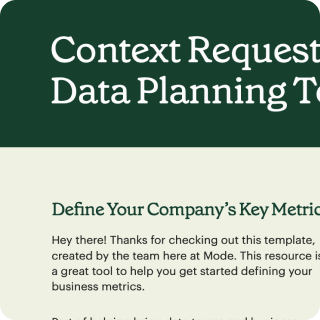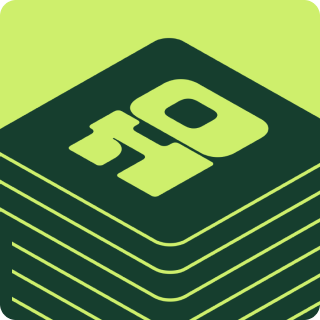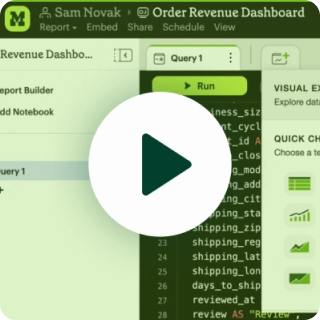Getting your first job in data science can be a full-time job all on its own. Simply finding a job post worth applying to can be a chaotic pursuit (though we've tried to make that part easier with our Data Jobs Board). Once you've found a job posting that looks like it could be a fit, you need to make sure you stand out from the crowd of other applicants.
As a data science job applicant, there are two stages to your search. First, you need to get an interview. To do that, you need documentation that you can fill the role. This is where your resume, your portfolio, and (unfortunately) your online presence come in. There are serious issues with looking up candidates on search engines, which range from creating unconscious bias to opening up murky legal situations, but it happens (not here at Mode though). For better or worse, it's worth taking a quick look at your name's search results to get a sense for what people might find.
Portfolios are especially useful for entry-level applicants without a deep job history; they can help recruiters see proof that you've got the technical chops required for the work you'll be doing in a role.
Next, you need to ace the interview. Evaluations during this stage mostly fall into two categories; your technical and non-technical aptitude. Remember that a large part of the role of a data scientist is communication. It doesn't matter how technically proficient you are if you can't explain the outcomes of your analysis. It's when you share your findings that you really bring value to the business.
We've curated this list of the best resources available for each stage to help you nail the job hunt and land a role you'll love.
70+ Resources for Transistioning to a Data Science Career
Get the Interview
If you're proactively reaching out to a company through a job posting, your resume and your portfolio will both likely be reviewed before you get a call from a recruiter.
LinkedIn offers powerful tools for hiring managers and job seekers alike, making it a favorite for recruiters to post jobs and find candidates. GitHub's features for hosting code repositories, data and interactive visualizations make it a great place to show off your work. These are two of the most common places for recruiters find prospects, so focus your time polishing your presence on these sites.
These resources can help you navigate this stage:
- Creating a Great Data Science Resume | In this post, Will Stanton, a data scientist with VictorOps and a data science writer and teacher, covers the most common questions involved in creating a data science resume, and lays out step-by-step instructions in very direct language.
- Creddle | This tool lets you enter your work history and experience and turns it into a customizable resume.
- What Makes A LinkedIn Profile Great? | Entrepreneur and writer Aaron Clayton-Dunn outlines 13 tips to help your profile stand out in a LinkedIn search, based on his own thousands of searches as a hiring manager.
- The key to building a data science portfolio that will get you a job | In this post, Vik Paruchuri, the founder of online data science education company DataQuest, explains how to create a data science portfolio that demonstrates the value you can bring to a business.
- How to present your data science portfolio on GitHub | Vik Paruchuri shows how to take your portfolio a step further and present it on Github.
Ace the Interview
With a great resume and portfolio, even as an entry-level candidate, you should be able to land an interview for a job worthy of your skills. Once you get the interview, the next stage of preparation begins.
Technical Interview Questions
The technical portion of the interview will vary widely based on the nature of the job itself. The most effective way to prepare is to research the company and its industry. Test yourself on example interview questions to get into the right frame of mind. As you work your way through example interview questions, think about how they might apply to the specific company and their data challenges. The following question sets include solutions, so you can check your work:
- Data Science Interview Questions & Detailed Answers | Jonathan Dahan, RPubs
- 40 Interview Questions asked at Startups in Machine Learning / Data Science | Analytics Vidhya
- 30 Questions to test a data scientist on Natural Language Processing | Analytics Vidhya
- 100 Data Science Interview Questions and Answers | Dezyre
- 21 Must-Know Data Science Interview Questions and Answers | Gregory Piatetsky, KDNuggets
- Highest-Voted “Machine Learning” Questions on StackOverflow | StackOverflow
The following question sets from Glassdoor do not include solutions, but they're interesting to examine nonetheless as they are all actual questions that have been asked in interviews with popular companies:
- 100 Data Science Interview Questions from Glassdoor, grouped by the company that asked them | LearnDataSci
- Top “Data Science” Interview Questions on Glassdoor | Glassdoor
Non-technical Interview Questions
No matter how adept you are in the technical skills of data science, working as part of a business means you'll need to be a deft communicator. Use questions like the following as a jumping off point to prepare for the non-technical aspects of the interview:
- Tell me a compelling story about data that you have analyzed. How did you communicate your findings and what were the impacts?
- Tell me about a challenge you've faced in explaining the outcome of an analysis.
- Tell me about a time you had a disagreement over a professional project. How did you handle it?
- Tell me about a personal goal you were able to accomplish this past year.
- How would you explain the idea of the Internet to a child?
- How would you explain to a non-technical colleague why they should care about model lift and accuracy?
- Which part of this industry/company/product interests you the most?
- What do you like about your current work environment, and what do you not like about it?
- Describe a situation where you had to decide between two different types of analyses – and why you chose the one you did.
- What’s the first question you’d want to ask our head of data science?
- What would you say is the most boring aspect of a data science job?
- What unique skills do you think you’d bring to the team?
- What data would you love to acquire if there were no limitations?
Springboard's Ultimate Guide to Data Science Job Interviews is a terrific guide to each-and-every step of the process. And when you're ready to find a great data job, be sure to start your search with Mode's Data Jobs Board.
Related Reading:






